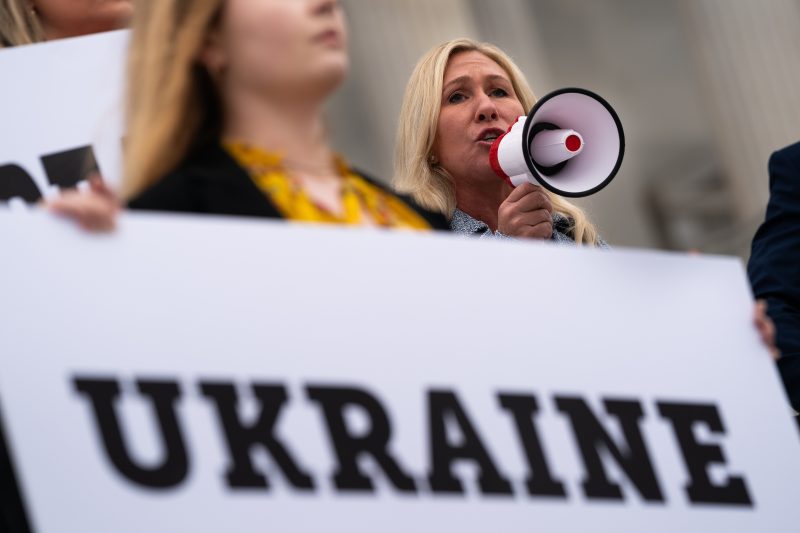Republican critics of Ukraine funding appear to be on the verge of finally succeeding in their long-sought goal of cutting off the aid.
But as they approach that goal, some in their party are warning of potential buyer’s remorse and how history might judge them, particularly if it paves the way for a Russian takeover of Ukraine.
What’s more, getting to this point could bring into focus an untidy and somewhat counterintuitive reality: that despite the GOP’s growing resistance to Ukraine funding, the Republican base is actually pretty fearful of what Russia taking Ukraine — and fearful of Russia more broadly — portends.
In recent days, we’ve seen some high-profile Ukraine-aid supporters invoke the historical and practical consequences of failure:
Senate Minority Leader Mitch McConnell (R-Ky.) said: “History settles every account. And today, on the value of American leadership and strength, history will record that the Senate did not blink.”Sen. Thom Tillis (R-N.C.) added: “Why am I so focused on this vote? Because I don’t want to be on the pages of history that we will regret. If we walk away, you will see the alliance that is supporting Ukraine crumble. You will ultimately see China become emboldened. And I am not going to be on that page of history.”Sen. Dan Sullivan (R-Alaska) also warned of the message it would send to China: “You can’t say, ‘Don’t worry, we’re going to let Putin roll here, but we’ll be really strong when the next dictator, Xi Jinping, tries to move on Taiwan.’”
The comments echo previous ones from other high-profile Republicans.
Former vice president Mike Pence has said that Russia taking over Ukraine could give China the “green light” in Taiwan and mean that “the rest of the 21st century could look a lot like the first half of the 20th century.”
Even House Speaker Mike Johnson (R-La.), who recently signaled that the House won’t vote on Ukraine aid despite Senate passage of a funding bill 70-29 last week (it would be very likely to pass in the House if voted upon), has warned in stark terms about what Ukraine’s failure would mean. In October, he said that he didn’t believe Putin would stop in Ukraine after a takeover and that it would “empower China to perhaps make a move on Taiwan.”
“Ukraine has to prevail,” he said shortly before becoming speaker.
These Republicans certainly don’t speak for their whole party. About half of Republican-leaning voters say we’re sending “too much” money to Ukraine. In a late 2023 poll, a majority said the United States shouldn’t send more funding and military aid.
But when it comes to fearing what might come next, these high-profile Republicans actually do kind of speak for their party.
Despite the GOP opposition to more funding, polls have repeatedly shown that even the Republican base is quite concerned about the outcome in Ukraine and the threat of Russia:
In a recent YouGov poll, 6 in 10 Republicans said they cared “a great deal” or a “fair amount” about who wins the war, and they wanted Ukraine rather than Russia to win, 69-5.In a Pew Research Center poll last week, 69 percent of Republican-leaning voters said the war was important to U.S. interests. Fifty-six percent said it was important to them personally.In a December Quinnipiac University poll, Republicans said 57 percent to 37 percent that supporting Ukraine was in the national interest.A March 2023 Gallup poll showed 60 percent of Republicans regarded Russia’s military power as a “critical threat” to the United States.A more recent poll for the Chicago Council on Global Affairs showed that nearly half of Republicans (47 percent) regarded Russia’s military power as a “critical threat” to “the vital interest of the United States in the next 10 years.”In another YouGov poll — for CBS News — 73 percent of Republicans said the United States should promise military help if Russia invades a NATO country. (The poll question did not mention that U.S. military support would be required under Article 5 of NATO’s charter.)
Perhaps anticipating the warnings from some in their party of the costs of cutting off Ukraine, some Ukraine-funding Republican critics like Sens. Ron Johnson (Wis.) and Mike Lee (Utah) have set about suggesting that Ukraine is essentially a lost cause. They’ve even suggested that U.S. dollars are merely prolonging the bloodshed and destruction.
(That’s not something most Americans seem to believe. One of those YouGov polls this month showed just 10 percent of Republicans and 9 percent overall believe that Ukraine will be under Russian control in a year. Only around 4 in 10 of both think Russia is even winning right now. “Putin is losing; this is not a stalemate,” Tillis countered his colleagues last week. “A 10-to-1 kill differential between Ukrainians and Russians is indisputable.”)
The logical extension of the lost-cause argument is that cutting Ukraine off now won’t actually be to blame for a really negative outcome — in Eastern Europe or elsewhere. It’s baked in. But plenty of big voices in the Republican Party have connected negative potential outcomes to the GOP cutting off funds, and plenty in the party’s base fear such outcomes.
The question now is whether that potential crossroads might change the priorities of those controlling what comes next.
And Johnson, for one, seems to have believed — at least at one point — that leaving Ukraine to fend for itself was a fraught call.







































